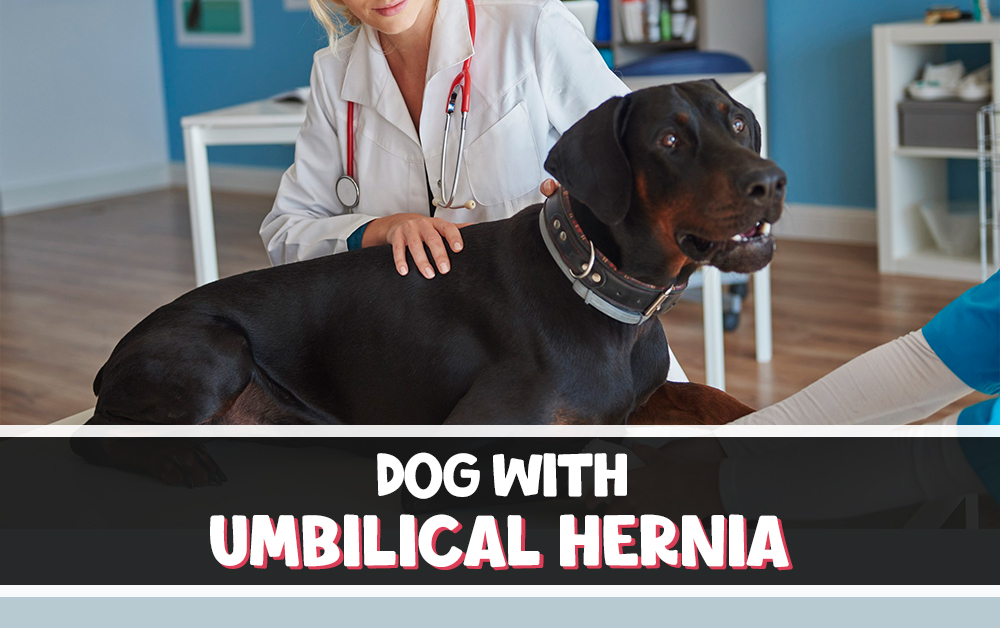Prospective puppy owners may be concerned about the potential risks and complications associated with umbilical hernias, wondering if purchasing a puppy with this condition is wise.
This blog will provide an in-depth overview of umbilical hernias in puppies and discuss the factors you should consider before deciding.
Understanding Umbilical Hernias in Puppies
Before deciding whether to purchase a puppy with an umbilical hernia, it’s crucial to understand the condition and its implications.
o What is an Umbilical Hernia? An umbilical hernia occurs when there is a minor defect in the abdominal wall at the site of the umbilical cord. This opening allows a portion of the intestines or fatty tissue to protrude, creating a visible bulge. Umbilical hernias can be congenital (present at birth) or acquired (developed later in life).
o Causes of Umbilical Hernias: Umbilical hernias can have various reasons, including genetics, improper handling of the umbilical cord during the whelping process, or weak abdominal muscles.
Types and Severity of Umbilical Hernias
Umbilical hernias can vary in size and severity, impacting the potential risks and treatment options.
o Reducible Hernias: A reducible hernia is a small, soft, non-painful bulge that can be easily pushed back into the abdomen. These hernias pose minimal risk and often resolve on their own without treatment.
o Non-Reducible Hernias: A non-reducible hernia is a more prominent, firm, and potentially painful bulge that cannot be pushed back into the abdomen. These hernias pose a higher risk of complications, such as intestinal strangulation or obstruction, and often require surgical intervention.
Long-Term Outlook and Management
When considering whether to buy a puppy with an umbilical hernia, it’s crucial to understand the long-term outlook and management of this condition. Here are some important points to consider:
Assessing the Likelihood of Natural Resolution
Small umbilical hernias can sometimes resolve independently as the puppy grows. The hernia may gradually close as the abdominal muscles strengthen and the tissues around the hernia site mature. It’s essential to consult with a veterinarian who can assess the size and severity of the hernia and provide insight into the likelihood of spontaneous resolution.
Discussing Potential Surgical Options
If the hernia does not resolve naturally or if it is causing discomfort or health concerns, surgical intervention may be recommended. The veterinarian can discuss the surgical procedure, associated risks, and benefits. Surgery typically involves repairing the hernia by suturing the abdominal muscles and closing the opening.
Understanding Long-Term Management
Long-term management is essential after a surgical intervention or when the hernia is left untreated, not causing health issues.
This includes;
· Regular Veterinary Check-ups: Schedule routine veterinary examinations to monitor the hernia’s progress, assess the puppy’s overall health, and address any concerns that may arise.
· Careful Monitoring of the Hernia: Keep a close eye on the hernia site for any changes in size, appearance, or signs of complications such as pain, redness, or swelling. Report any unusual symptoms to your veterinarian promptly.
· Preventative Measures: Take precautions to prevent strain or trauma to the hernia site. Avoid activities that may put excessive pressure on the abdominal area, and use a harness instead of a collar for leash attachment to reduce pulling on the abdomen.
· Addressing Complications: Immediate veterinary attention is necessary if complications arise, such as the hernia becoming incarcerated or strangulated (where the hernia contents become trapped or the blood supply is compromised). These situations require urgent surgical intervention to avoid serious health risks.
Diagnosing and Treating Umbilical Hernias in Puppies
A veterinarian can assess the severity of an umbilical hernia and recommend appropriate treatment options.
o Diagnosis: A physical examination is typically sufficient to diagnose an umbilical hernia. In some cases, your veterinarian may recommend additional tests, such as an ultrasound or X-ray, to assess the extent of the hernia and any potential complications.
o Treatment Options: Treatment for an umbilical hernia depends on its size and severity:
o Small, reducible hernias often resolve on their own without treatment.
o Larger or non-reducible hernias may require surgery, typically performed during spaying or neutering, to minimize the need for multiple procedures.
Factors to Consider Before Purchasing a Puppy with an Umbilical Hernia
Before deciding whether to buy a puppy with an umbilical hernia, consider the following factors:
o The severity of the Hernia: Understanding the severity of the hernia is essential for assessing potential risks and treatment needs. Smaller, reducible hernias are less concerning than larger, non-reducible hernias.
o Potential Health Risks and Complications: Consider the potential health risks and complications associated with an umbilical hernia, such as strangulation or obstruction, and discuss these risks with your veterinarian.
o Financial Implications: If your puppy requires surgical intervention, consider the costs associated with the procedure and any follow-up care.
o Breeding Considerations: If you plan to breed your dog in the future, remember that umbilical hernias may have a genetic component. Consult with your veterinarian about the potential risks of passing this condition to future generations.
o Communication with the Breeder: Discuss the puppy’s condition with the breeder, ensuring they are aware of the hernia and have taken appropriate measures to address it. Reputable breeders should be transparent about any health issues present in their puppies.
Making an Informed Decision
By considering the factors mentioned above and consulting with your veterinarian, you can make an informed decision about purchasing a puppy with an umbilical hernia.
o Weighing the Risks and Benefits: Consider the severity of the hernia, potential health risks, financial implications, and breeding considerations when deciding whether to buy a puppy with an umbilical hernia.
o Seeking Veterinary Advice: Consult with your veterinarian about the puppy’s condition, potential treatment options, and their recommendations regarding the purchase.
o Working with a Reputable Breeder: Ensure that you are working with a reputable breeder who prioritizes the health and well-being of their puppies. A responsible breeder will provide transparent and honest information about the puppy’s condition and address any concerns you may have.
Caring for a Puppy with an Umbilical Hernia
If you purchase a puppy with an umbilical hernia, it’s crucial to provide appropriate care and monitoring to ensure their health and well-being.
o Regular Check-ups: Schedule regular check-ups with your veterinarian to monitor the hernia’s progression and address potential complications early.
o Proper Handling: When handling your puppy, avoid putting pressure on the hernia to prevent discomfort or injury. Teach children and other family members to handle the puppy gently, especially around the affected area.
o Monitoring for Changes: Keep a close eye on the hernia for any size, shape, or firmness changes. If you notice any changes or your puppy shows signs of pain or discomfort, consult your veterinarian promptly.
o Preparing for Surgery (if needed): If your puppy requires surgery for their hernia, follow your veterinarian’s pre-and post-operative care instructions to ensure a smooth recovery.
Emotional Support and Socialization for Puppies with Umbilical Hernias
A puppy with an umbilical hernia may require extra emotional support and socialization to help them feel comfortable and confident throughout their development.
o Emotional Support: Provide your puppy with a loving and nurturing environment, offering plenty of positive reinforcement and encouragement. This support will help your puppy feel safe and secure as they navigate their new world.
o Socialization: Introduce your puppy to various people, animals, and environments to help them develop into a well-rounded and adaptable adult dog. Socialization is vital for puppies with health concerns, as it can help them build resilience and confidence in facing potential challenges.
o Training and Mental Stimulation: Engage your puppy in positive reinforcement training and mental stimulation exercises to promote their cognitive development and create a strong bond between you and your pet. This bond will be precious if your puppy requires ongoing care or medical intervention for their umbilical hernia.
By incorporating these care and support strategies into your puppy’s routine, you can create a nurturing and supportive environment that promotes their overall health, happiness, and well-being, regardless of their umbilical hernia.
Frequently Asked Questions
Q1: Will an umbilical hernia in a puppy resolve on its own over time?
Small umbilical hernias can sometimes close on their own as the puppy grows and develops stronger abdominal muscles. However, it’s essential to consult with a veterinarian to assess the size and severity of the hernia and determine the likelihood of spontaneous resolution.
Q2: What happens if the umbilical hernia doesn’t resolve naturally?
Surgical intervention may be recommended if the hernia does not resolve independently or causes discomfort or health concerns. The veterinarian can discuss the surgical procedure, associated risks, and benefits.
Q3: Is surgery the only option for treating an umbilical hernia in a puppy?
Surgery is the most common treatment option for umbilical hernias that require intervention. However, smaller hernias not causing health issues may be monitored without surgical intervention, as they may close on their own over time.
Q4: What should I expect after surgical repair of the umbilical hernia?
After surgery, the veterinarian will provide specific post-operative care instructions, including monitoring the incision site, administering medications, and limiting physical activity. Follow these instructions closely to ensure proper healing.
Q5: How often should I have my puppy with an umbilical hernia checked by a veterinarian?
Monitor the hernia’s progress, and assess the ovepuppy’s overall health. The frequency of check-ups may vary based on the veterinarian’s recommendation, but typically, regular examinations are scheduled throughout the puppy’s growth period.
Q6: Can complications arise from an umbilical hernia in a puppy?
While rare, complications such as incarceration or strangulation of the hernia can occur. These situations require immediate veterinary attention and may necessitate urgent surgical intervention to prevent serious health risks.
Q7: Can a puppy with an umbilical hernia live an everyday, healthy life?
With appropriate management and care, most puppies with umbilical hernias can live normal, healthy lives. Proper veterinary guidance, routine check-ups, and following recommended preventive measures are key to ensuring the well-being of the puppy.
Q8: Should I be concerned about the long-term impact of an umbilical hernia on my puppy’s health? While umbilical hernias can vary in size and severity, most cases do not cause significant long-term health concerns. However, it’s important to consult a veterinarian to assess the specific hernia and receive professional guidance tailored to your puppy’s situation.
Conclusion
Deciding whether to buy a puppy with an umbilical hernia requires careful consideration of the condition’s severity, potential health risks, financial implications, and breeding plans.
By consulting with your veterinarian, working with a reputable breeder, and providing appropriate care and emotional support, you can help your puppy with an umbilical hernia lead a happy and healthy life as a cherished family member.
Purchasing a puppy with an umbilical hernia is a decision that should be made after careful consideration of the severity of the condition, potential health risks, financial implications, and breeding plans.

